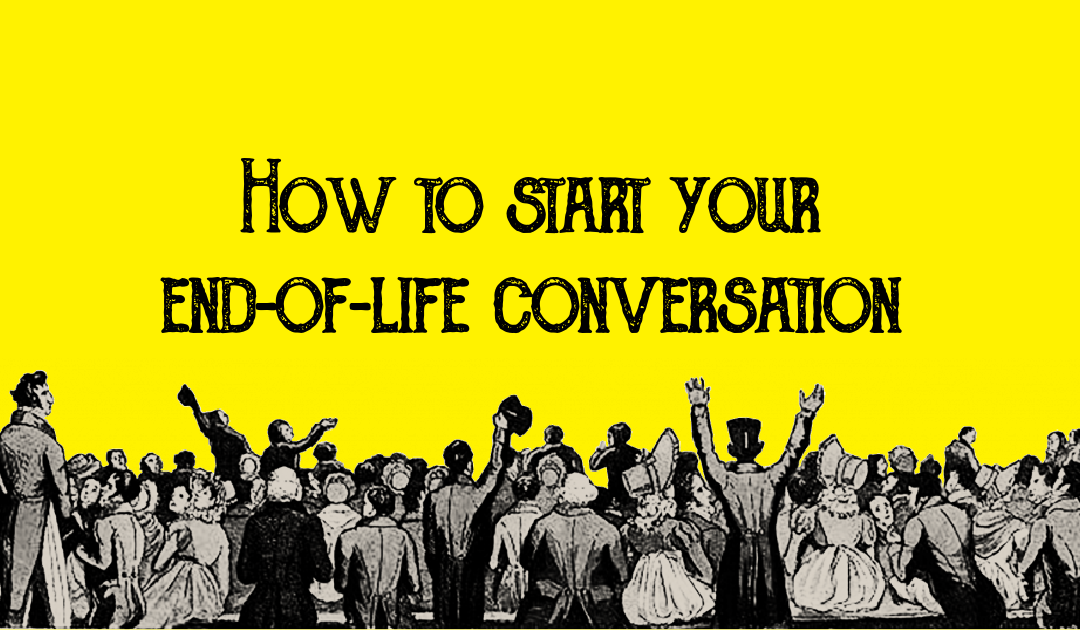Want to start your end-of-life conversation? Check out our toolkit entitled The Great Last Impression. And check out these conversation prompts to get the conversation started about your Great Last Impression.
Starting your end-of-life conversation
The start is often the trickiest part of an end-of-life conversation. Here are some prompts to help you start on a good footing.
I want the last impression I make on earth to be a good one. Can we talk about that?
I’d love to die at home if I can. I have a few ideas on how we can make that happen. Can I share them with you?
I know this disease/illness is going to take away my ability to communicate. So, I’d like to plan ahead to make sure we reduce stress on both of us when that happens.
I would like to die . I need your help to make that happen.
Can we talk about my advance care plan, please?
When I die, I want to be surrounded by people I love. Can you help me plan what that would look like?
When I die, I’d rather my friends looked after me than my family. I have made some plans to make that happen.
When I die, I’d like to . What does that sound like to you?
When I die, I want to .
When it comes to medical interventions, there is a line where how long I live would take away quality of life for me. And that line is .
The things I value most in life is my ability to . How that would influence my experience of end-of-life is .
I would like you to remember me as . That means, I want the following things at end-of-life.
I would like you to remember me as . That means, I don’t want the following things at end-of-life.
Dying with dignity means .
I have created my advance care plan, which is a document that helps decide my care choices if I lose the ability to advocate for myself. Can I talk you through it?
What a good death looks like to me is…
What matters to me most when I die is…
Setting a time to talk
Always remember to set a time to hold your end-of-life conversation and talk about death related matters. That way, you don’t accidentally ambush someone or broach the subject at a time that doesn’t work for them.
I have been thinking about death lately and I’d like to share my thoughts.
I would like to talk about my end-of-life wishes. How is for you?
I’d like to make a time to talk about my advance care plan. When is good for you?
When died, it was difficult for me. I don’t want you to experience the same thing. Can we make a time to talk about my end-of-life plans?
When have you got time to talk about my end-of-life plans?
It’s time for us to talk about what will happen when I die. It’s really important to me.
I am keenly aware of my mortality these days – I need to get a few things off my chest.
It would help lower my stress if we spent time talking about my diagnosis/illness/disability/disease and my end-of-life plans. When would suit you?
If I lose the ability to speak for myself at the end of my life, I still want my choices honoured. I’d like to share what that looks like for me if you have time?
When we get together for , I’d like to take about my end-of-life plan. Would you prefer to talk before or after the event?
I know talking about death is difficult for you. But I’d prefer to talk through my plan now to save you more stress later on. When have you got time to discuss my end-of-life plans?
I am planning ahead so you can focus on your grief and looking after our family when I die. But I need your input to make that happen. Have you got time to talk soon?
If I can’t die , an alternative would be to .
I received some difficult health news recently and I’d like to talk about it.
When I die, I want it to be on my terms. Can we talk about what that would look like?
I have worked out what a good death looks like for me, and I want to share that with you.
Countering objections
You may face some resistance to starting your end-of-life conversation. These phrases are designed to help you counter those objections in a respectful way.
By talking about my end-of-life plans now, I want to save both of us from stress later.
Planning for end-of-life doesn’t mean I have given up on life. It simply means I want the dignity I have now to carry through until my dying day.
We have complex dynamics in our family that can be difficult to navigate. By planning my end-of-life experience ahead of time, I am confident we can reduce the impact and number of problems these dynamics create.
It’s important to me to die on my own terms. That’s why I’d like to talk you through my end-of-life plan now.
An advance care plan is about outlining what treatments I want if I lose the ability to advocate for myself.
I don’t want to die in a medicalised environment. I need to fill you in so you know what I would prefer.
Talking about death won’t make it happen. But it will make my death less chaotic and less stressful when it does.
A lot of people die receiving unnecessary, painful and costly medical interventions. I want to avoid that if possible.
I don’t want you to suffer more than you have to as I die. That means having a solid plan for when I die.
I don’t want my death to be a source of family arguments, drama and trauma. That’s why I want to talk about my end-of-life experience now.
Planning for a death is more than a will or having someone look after an estate. Can we please talk?
I want to die at home. Talking about it means I have a better chance of making that happen.
I don’t want my last impression on earth to be a bad one. That’s why I am planning ahead.
Follow up after your end-of-life conversation
After a successful end-of-life conversation, always circle back and check in with your loved ones so they know you are thinking of them. Make sure everything is OK. Especially if you talked about some difficult subjects.
From the top of the call/conversation to now, how are you feeling?
When we last talked, you had some hesitations about discussing my end-of-life experience. How are you feeling now?
It’s been a while since we talked about my end-of-life plans. How are you feeling now?
Our conversation the other week was a tough one. Are you OK?
Now that you’ve had time to reflect, what do you think about my end-of-life plans?
Are we OK after last month’s end-of-life conversation?
Did you have any more questions now you’ve had a chance to think about my end-of-life plans?
Always thank the person!
Having an attitude of gratitude can do a lot to make conversations related to your end-of-life plans easier on everyone.
Thank you for hearing me out. I know this was difficult for you.
Thank you for agreeing to help me. It means a lot to me.
Thank you for your great ideas. It’s really helped make me feel valued and loved.
You’ve really made me feel supported and heard. Thank you.
Thank you for listening.
Check out these great conversation prompts you can download.
Want more ways to tackle the end-of-life conversation? Download the Great Last Impression and/or head to our blog now!






